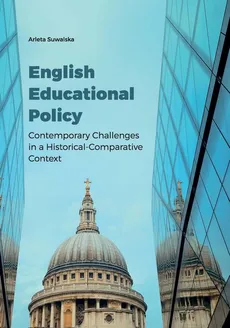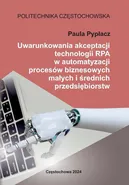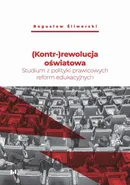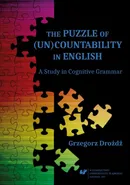English Educational Policy
The book concerns contemporary ideological discourses, preceded by a synthetic analysis of the roots of political changes in education in England. The author focusses on trends and stages of educational development from the tenth century to the post-war reform of the education system in England. Also presented are the neoliberal trend in English educational policy and the genesis of the 1998 educational reforms in England and their consequences up to 2013.
“The book constitutes an interesting proposal in the field of educational policy in a historical-comparative context [...]. A monograph-like approach to the subject and a combination of educational ideologies and historical traditions with the new challenges facing English education constitute the value of this book.”
Renata Nowakowska-Siuta, Dean of the Faculty of Education.
Head of the Department of Teaching and Education School.
Christian Theological Academy in Warsaw
- Kategorie:
- ISBN: 978-83-8088-543-1
- ISBN druku: 978-83-8088-542-4
- Liczba stron: 168
-
Sposób dostarczenia produktu elektronicznegoProdukty elektroniczne takie jak Ebooki czy Audiobooki są udostępniane online po opłaceniu zamówienia kartą lub przelewem na stronie Twoje konto > Biblioteka.Pliki można pobrać zazwyczaj w ciągu kilku-kilkunastu minut po uzyskaniu poprawnej autoryzacji płatności, choć w przypadku niektórych publikacji elektronicznych czas oczekiwania może być nieco dłuższy.Sprzedaż terytorialna towarów elektronicznych jest regulowana wyłącznie ograniczeniami terytorialnymi licencji konkretnych produktów.
-
Ważne informacje techniczneMinimalne wymagania sprzętowe:procesor: architektura x86 1GHz lub odpowiedniki w pozostałych architekturachPamięć operacyjna: 512MBMonitor i karta graficzna: zgodny ze standardem XGA, minimalna rozdzielczość 1024x768 16bitDysk twardy: dowolny obsługujący system operacyjny z minimalnie 100MB wolnego miejscaMysz lub inny manipulator + klawiaturaKarta sieciowa/modem: umożliwiająca dostęp do sieci Internet z prędkością 512kb/sMinimalne wymagania oprogramowania:System Operacyjny: System MS Windows 95 i wyżej, Linux z X.ORG, MacOS 9 lub wyżej, najnowsze systemy mobilne: Android, iPhone, SymbianOS, Windows MobilePrzeglądarka internetowa: Internet Explorer 7 lub wyżej, Opera 9 i wyżej, FireFox 2 i wyżej, Chrome 1.0 i wyżej, Safari 5Przeglądarka z obsługą ciasteczek i włączoną obsługą JavaScriptZalecany plugin Flash Player w wersji 10.0 lub wyżej.Informacja o formatach plików:
- PDF - format polecany do czytania na laptopach oraz komputerach stacjonarnych.
- EPUB - format pliku, który umożliwia czytanie książek elektronicznych na urządzeniach z mniejszymi ekranami (np. e-czytnik lub smartfon), dając możliwość dopasowania tekstu do wielkości urządzenia i preferencji użytkownika.
- MOBI - format zapisu firmy Mobipocket, który można pobrać na dowolne urządzenie elektroniczne (np.e-czytnik Kindle) z zainstalowanym programem (np. MobiPocket Reader) pozwalającym czytać pliki MOBI.
- Audiobooki w formacie MP3 - format pliku, przeznaczony do odsłuchu nagrań audio.
Rodzaje zabezpieczeń plików:- Watermark - (znak wodny) to zaszyfrowana informacja o użytkowniku, który zakupił produkt. Dzięki temu łatwo jest zidentyfikować użytkownika, który rozpowszechnił produkt w sposób niezgodny z prawem. Ten rodzaj zabezpieczenia jest zdecydowanie bardziej przyjazny dla użytkownika, ponieważ aby otworzyć książkę zabezpieczoną Watermarkiem nie jest potrzebne konto Adobe ID oraz autoryzacja urządzenia.
- Brak zabezpieczenia - część oferowanych w naszym sklepie plików nie posiada zabezpieczeń. Zazwyczaj tego typu pliki można pobierać ograniczoną ilość razy, określaną przez dostawcę publikacji elektronicznych. W przypadku zbyt dużej ilości pobrań plików na stronie WWW pojawia się stosowny komunikat.
Introduction 11 1.1. State of knowledge of the ideologies of education and subject of study 11 1.2. Methodological justification of the research 14 1.3. Research methodology 15 1.3.1. The politolinguistic approach in the analysis of political rhetoric 15 1.3.2. Analysis of documents and study of discourses in political rhetoric 16 Chapter 1. The political system of the state, the school system, and democracy 19 1.1. The nature and content of the concept of “educational ideology” 19 1.1.1. Development of the concept of “ideology”: its origin and content 19 1.1.2. Features of contemporary ideology 25 1.1.3. Ideology and political doctrine 25 1.1.4. Pedagogical doctrine 26 1.1.5. Classifications of political thought 27 1.2. Democracy, the political system of the state and ideology education 29 1.2.1. Development of the concept of “democracy” 29 1.2.2. The political system: definition and development 32 1.2.3. Fascist ideology and education 32 1.2.3.1. The ideology of the Communism of Lenin and education 34 1.2.3.2. Liberalism and education 36 1.2.4. Conservatism and education 37 1.3. Economy and state politics 38 1.3.1. The functions of the state in a capitalist market economy in the context of economic policy 41 1.4. Educational change and education policy 41 1.4.1. The importance of educational change 43 1.4.2. Reasons for initiating educational change and the associated processes 44 1.4.2.1. Characteristics of change 44 1.4.2.2. The teacher and educational change 45 1.4.2.3. Planning educational change 46 Chapter 2. The evolution of educational thought and the ideology of education in the history of England from the tenth to the end of the seventeenth century 51 2.1. The Church’s monopoly on teaching 53 2.2. Bourgeois education 54 2.3. Education of youth 55 2.4. The beginnings of higher education: the Universities of Cambridge, Oxford and London 56 2.5. The monopoly of the Church in teaching and church schools 57 2.6. The historical background of the development of Protestantism in England 60 2.6.1. The doctrine of the Church of England 63 2.7. British political thought and education in the Age of Enlightenment 63 Chapter 3. Pedagogical thought and educational ideologies in the United Kingdom from 1707 to World War II 65 3.1. The pedagogical views of Jean-Jacques Rousseau 65 3.2. British political thought and education in the Age of Enlightenment 66 3.3. The positivistic trend in British education 67 3.4. The schools of mutual instruction of Lancaster and Bell 68 3.5. The Chartist movement and educational changes associated with the creation of the London Working Men’s Association 69 3.6. Pedagogical and educational thought of the European workers’ movement in England 70 3.7. The English utopian socialism of Robert Owen 71 3.8. Herbert Spencer and his pedagogical views 71 3.9. The Elementary Education Act 1870 72 3.10. Directions and stages of development of public education in the United Kingdom: primary and secondary schools 73 3.11. The structure of higher education 75 3.12. Christian education in the nineteenth century 75 3.13. Fisher Education Act 77 3.14. John Dewey and progressive pedagogy 80 3.14.1. The assumptions of pedagogy of John Dewey and his school 81 Chapter 4. Ideological contexts of the educational reforms of 1944 and 1988 in Britain and their consequences over the past twenty years 83 4.1. The Education Act of 1944 83 4.1.1. Primary schools 85 4.1.2. Secondary education 85 4.1.2.1. Public schools 85 4.1.2.2. Grammar school 86 4.1.2.3. Technical schools 87 4.1.2.4. Modern school 88 4.1.2.5. Further education 89 4.2. Open University and the neo-liberal free market principles in universities 90 4.3. The Plowden Report 91 4.4. Genesis of educational reform in England and Wales, 1998 93 4.5. The ideology of the New Right in Britain in the 1980s 93 4.6. The ideology of neoliberalism and corporatism in the UK in the second period of educational change 95 4.7. The Reform Act of 1988 in the light of the ideological contexts 99 4.8. The consequences of the Education Reform Act of 1988 101 4.9. Post-Thatcher education reform in the UK 103 4.10. Teachers’ careers 104 4.11. Local Education Authorities 105 4.12. Headmasters and school governing bodies 106 4.13. The system of compulsory education for children between the ages of 5 to 16 years in England, Wales, and Northern Ireland 107 4.14. Pre-school education 108 4.15. Education of students from 16 to 19 years 109 4.16. Neoliberalism and universities 110 4.17. Summary 112 Chapter 5. The educational policy of the governments of Tony Blair, Gordon Brown, and David Cameron in the light of sociopolitical changes 115 5.1. The political leadership of the Labour Party in the years 1997‒2007 115 5.2. The cultural revolution during the Tony Blair era 116 5.3. Detraditionalization in conservative terms 117 5.4. The most important achievements of David Blunkett, Secretary of State for Education and Employment, 1997‒2001 119 5.4.1. Social solutions and pro-family policy of the Labour Party 119 5.4.2. Organizational solutions favorable to changes in British education 121 5.4.3. Education Management 122 5.4.4. The changing competencies of headmasters 124 5.4.5. Changes in the field of early childhood education 125 5.4.6. Education Action Zones 126 5.4.7. Collecting data about students 126 5.4.8. Adult education and the Learning Age 127 5.4.9. Further education 129 5.4.10. Higher education 130 5.4.11. Summary 132 5.5. Educational policy of Estelle Morris, 2001‒2002 132 5.6. Policy of Charles Clarke, Secretary of State for Education and Skills (October 2002‒December 2004) 135 5.6.1. The National Strategy for Child Care (2004) 135 5.6.2. Faith-based schools in Britain in the twenty-first century 136 5.6.3. Every Child Matters 137 5.7. Educational policy of Ruth Kelly, Secretary of State for Education and Skills (December 2004‒May 2006) 139 5.8. Educational policy of Alan Johnson as Secretary of State for Education and Skills (May 2006‒June 2007) 139 5.8.1. Summary 140 5.9. Educational policy of Prime Minister Gordon Brown and the end of the Labour government 141 5.9.1. Educational policy of Ed Balls (2007‒2010) 142 5.10. The world of the early twenty-first century from the perspective of postmodernism 144 5.10.1. Foreign and domestic policy of David Cameron 147 5.10.2. Education policy of David Cameron 148 5.10.3. Hidden curriculum, social inequalities and cultural reproduction in British education 149 5.10.4. Schools and Colleges 152 5.10.5. The perception of the teacher in education under the government of David Cameron 154 5.10.6. Global “Fourth Way” of educational change 155 5.10.7. Summary 158 Bibliography 161






















































